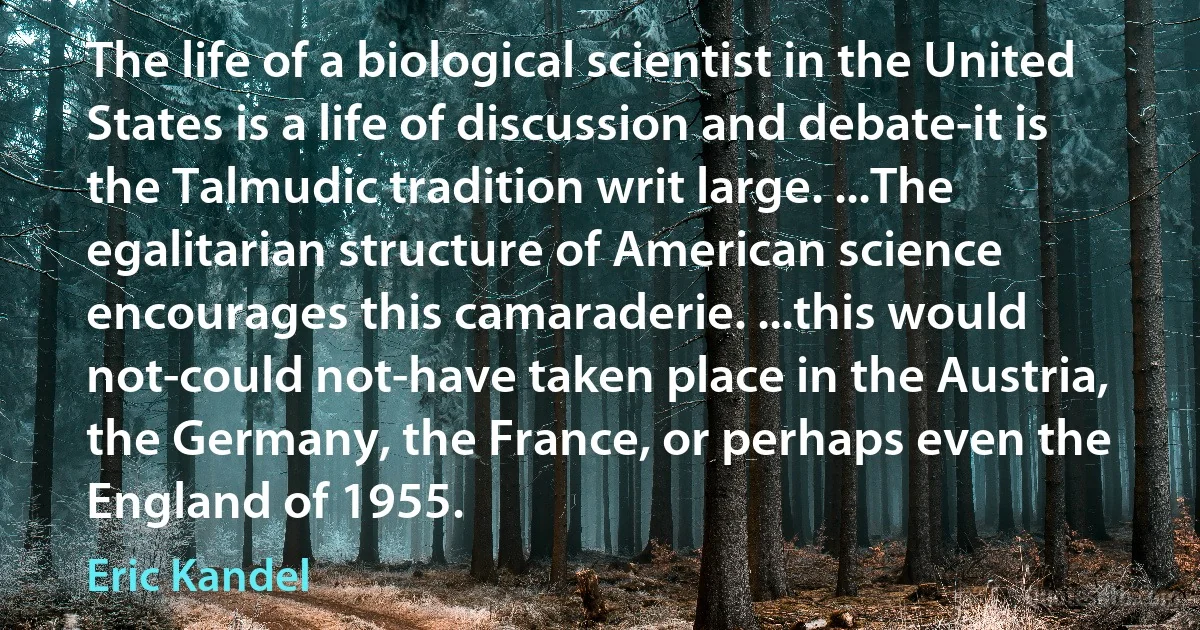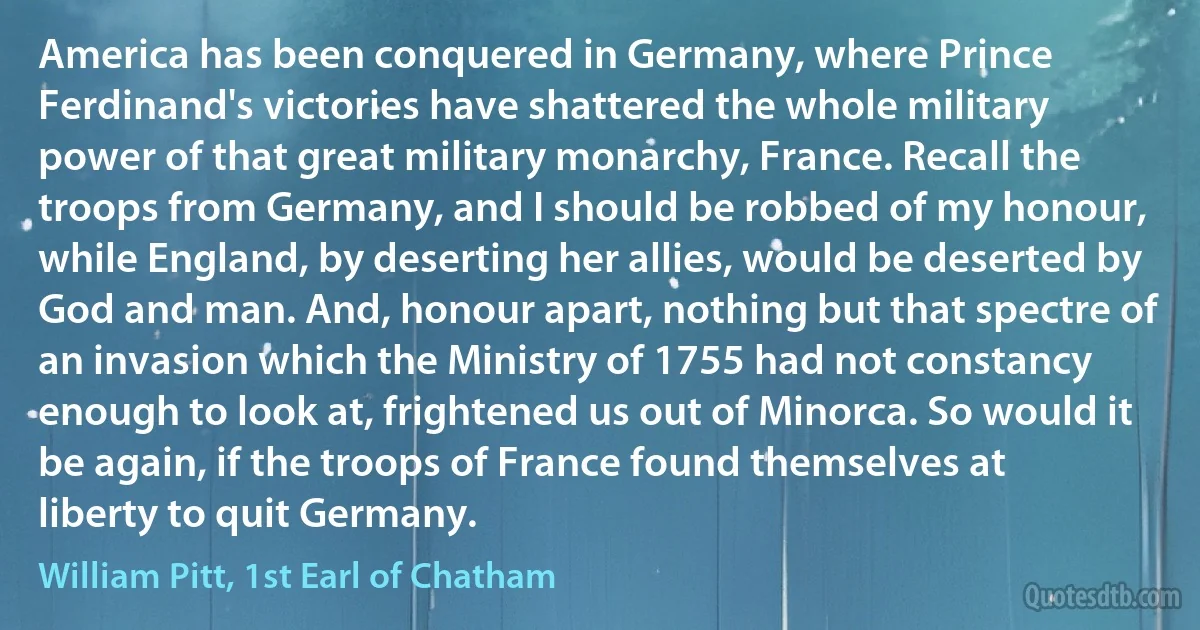France Quotes - page 40
The Roman Catholic Church has withstood in Europe and in Ireland the fiercest storms. In France it has survived Voltaire and Lepaux, the French Revolution and the Goddess of Reason; in England, Queen Elizabeth, William the Third, and the Penal Laws. In Ireland it still confronts us with four times as many adherents as all the Protestant churches. If we look to the fate of sovereigns, we find that James the Second forfeited the crown of England, and that Charles the Tenth sacrificed the crown of France, rather from devotion to the Church of Rome than from the failure of their political ambition.

John Russell, 1st Earl Russell
Can my fond heart, on such a feeble proof,
Embrace a faith, abhorred by him I love?
I see too plainly custom forms us all;
Our thoughts, our morals, our most fixed belief,
Are consequences of our place of birth:
Born beyond Ganges, I had been a Pagan;
In France, a Christian; I am here a Saracen:
'Tis but instruction, all! Our parents' hand
Writes on our heart the first faint characters,
Which time, re-tracing, deepens into strength,
That nothing can efface, but death or Heaven.

Aaron Hill (writer)
I tell you again that the recollection of the manner in which I saw the Queen of France in the year 1774 and the contrast between that brilliancy, Splendour, and beauty, with the prostrate Homage of a Nation to her, compared with the abominable Scene of 1789 which I was describing did draw Tears from me and wetted my Paper. These Tears came again into my Eyes almost as often as I lookd at the description. They may again. You do not believe this fact, or that these are my real feelings, but that the whole is affected, or as you express it, 'downright Foppery'. My friend, I tell you it is truth-and that it is true, and will be true, when you and I are no more, and will exist as long as men-with their Natural feelings exist.

Edmund Burke
[T]he rise of Germany into the front rank of the commercial Powers of the world was the most remarkable illustration that was to be found of the practical value of education, organization, and concentration. ... Any man who read the accounts of what was done and provided in France, Germany, Belgium, Austria, and, above all, the United States of America, and contrasted the magnificent educational apparatus in which the humblest boy in those countries might aspire to be a participant with our own scanty, slovenly, unscientific, and ill-organized system, or want of system, would no longer be at a loss to understand why England was handicapped in the race for commercial supremacy.

H. H. Asquith
After the March to Finchley, the next print I engraved, was the Roast Reef of old England; which took its rise from a visit I paid to France the preceding year. The first time an Englishman goes from Dover to Calais, he must be struck with the different face of things at so little a distance. A farcical pomp of war, pompous parade of religion, and much bustle with very little business. To sum up all, poverty, slavery, and innate insolence, covered with an affectation of politeness, give you even here a true picture of the manners of the whole nation... By the fat friar, who stops the lean cook that is sinking under the weight of a vast sirloin of beef, and two of the military bearing off a great kettle of soup maigre, I meant to display to my own countrymen the striking difference between the food, priests, soldiers, &c. of two nations so contiguous, that in a clear day one coast may be seen from the other.

William Hogarth
Mistakes have been made; do not think of them except to rectify them. Alas, there have also been crimes, crimes against France which call for a prompt punishment. We promise you, we promise the country, that justice will be done according to the law. ... Weakness would be complicity. We will avoid weakness, as we will avoid violence. All the guilty before courts-martial. The soldier in the court-room, united with the soldier in battle. No more pacifist campaigns, no more German intrigues. Neither treason, nor semi-treason: the war. Nothing but the war. Our armies will not be caught between fire from two sides. Justice will be done. The country will know that it is defended.

Georges Clemenceau
From the German point of view the monstrous problem thus set must inevitably be solved by the apotheosis of the German peoples. In the meantime, far from ‘German culture' seeming disposed to reform itself, we hear it proclaiming louder than ever a universal right to supreme domination, which confers on it the right of life and death over the nations, to be asserted and enforced by all possible means. Ought we not all to feel menaced in our very vitals by this mad doctrine of universal Germanic supremacy over England, France, America, and every other country?

Georges Clemenceau
To-day Germany is once more trying to construct, by methods of peace, a Germanic Empire that she failed to bring into being by means of war. That she could never do without eventualities that may change the destinies of a France exposed to every hostile enterprise. What will become of us in this welter of countries the development of whose strength in the future no man can foresee? There are nations that are beginning. There are nations that are coming to an end. Our consciousness of our own acts entails the fixing of responsibilities. France will be what the men of France deserve.

Georges Clemenceau
It is Germany, guilty of the greatest crime in the history of Europe, a crime premeditated, prepared, and carried out in broad daylight, who presents herself vanquished at the tribunal of Europe and the civilized world, no longer to give an account but to demand one. A lie sets her free. A lie puts us in the dock. And our policy of incoherency run wild is about to lay itself open to processes of dismemberment that will reduce the Treaty of Versailles to a state of nullity. Every day will see Germany requesting, demanding, to have her burdens lightened in order to heap them on France, already drained to the last drop of her blood, and every day something of the burden of defeat will be transferred from Germany's shoulders to what still exists of France by the good graces of the Treaty's executors.

Georges Clemenceau
To be sure, the usual suspects are bound to oppose this civilizational viewpoint. With their studied superficiality, the secularists view India as a hodge-podge of "communities”, of which a very recent one, concocted by the "Orientalists”, is Hinduism. Just as I finish this article, my attention is drawn to a French magazine celebrating the appointment of an Indian secularist historian to the Collège de France with an interview. There, he speaks out against the very notion of a Hindu civilization. The whole is not real, only the fragments are. The notion of an over-arching civilizational unity and long-term continuity may be obvious in China, and get applause there, but in India it is "communal!” (Ch 18)

Koenraad Elst
After spending a year or so in France, Scotland, and England, he returned to Milan as professor of science, and shortly afterward was elected to a chair at Pavia. Here he divided his time between debauchery, astrology, and mechanics. His two sons were as wicked and passionate as himself: the elder was in 1560 executed for poisoning his wife, and about the same time Cardan in a fit of rage cut off the ears of the younger who committed some offence; for this scandelous outrage he suffered no punishment, as Pope Gregory XIII granted him protection.

Gerolamo Cardano
...as the great Unitarian preacher Channing pointed out, that in France and Spain there are multitudes who have proceeded from rejecting Popery to absolute atheism, because "the fact is, that false and absurd doctrines, when exposed, have a natural tendency to beget skepticism in those who receive them without reflection. None are so likely to believe too little as those who have begun by believing too much." Here is, indeed, the terrible danger of believing too much. But no! the terrible danger comes from another quarter - from seeking to believe with the reason and not with the life.

Miguel de Unamuno
In the middle of a lecture I would have a sudden very clear experience of men on the march up the Béthune–La Bassée road; the men would be singing... These daydreams persisted like an alternate life and did not leave me until well in 1928. The scenes were nearly always recollections of my first four months in France; the emotion-recording apparatus seems to have failed after Loos.

Robert Graves
What England has done across the centuries and in the world is recognised as immense. Although there have often been conflicts with France, Britain's glorious participation in the victory which crowned the First World War-we French, we shall always admire it. As for the role England played in the most dramatic and decisive moments of the Second World War, no one has the right to forget it. In truth, the destiny of the free world, and first of all ours and even that of the United States and Russia, depended in a large measure on the resolution, the solidity and the courage of the English people, as Churchill was able to harness them. Even at the present moment no one can contest British capacity and worth.

Charles de Gaulle
It is not true, that the granting of the independence of America was "an advantage to England.” It was, on the contrary, the greatest evil that ever befell her. It was the primary cause of the present war, and of all the calamities which it has brought upon England and upon Europe. If England and the American States had continued united, they would have prevented France from disturbing the peace of the world. That fatal measure, though it has not curtailed our commerce, has created a power who will be capable of assisting France in any of her future projects against us, and whose neutrality, when France recovers her marine, must be purchased by us at the expense, first of commercial concessions, and, finally, by much more important sacrifices. In short, it laid the foundation of the ruin of the British empire, which can be prevented by nothing but a wisdom, and an energy, which have never yet marked the councils of our Government, in its transactions with the American States.

William Cobbett
Whether I'm sitting on a railway concourse in Brussels or pottering down the canals of South Western France or hurtling along a motorway in Croatia, I feel way more at home than I do when I'm trying to get something to eat in Dallas or Sacramento. I love Europe and to me, that's important.

Jeremy Clarkson
Without cancer, I never would have won a single Tour de France. Cancer taught me a plan for more purposeful living, and that in turn taught me how to train and to win more purposefully. It taught me that pain has a reason, and that sometimes the experience of losing things - whether health or a car or an old sense of self - has its own value in the scheme of life. Pain and loss are great enhancers.

Lance Armstrong



